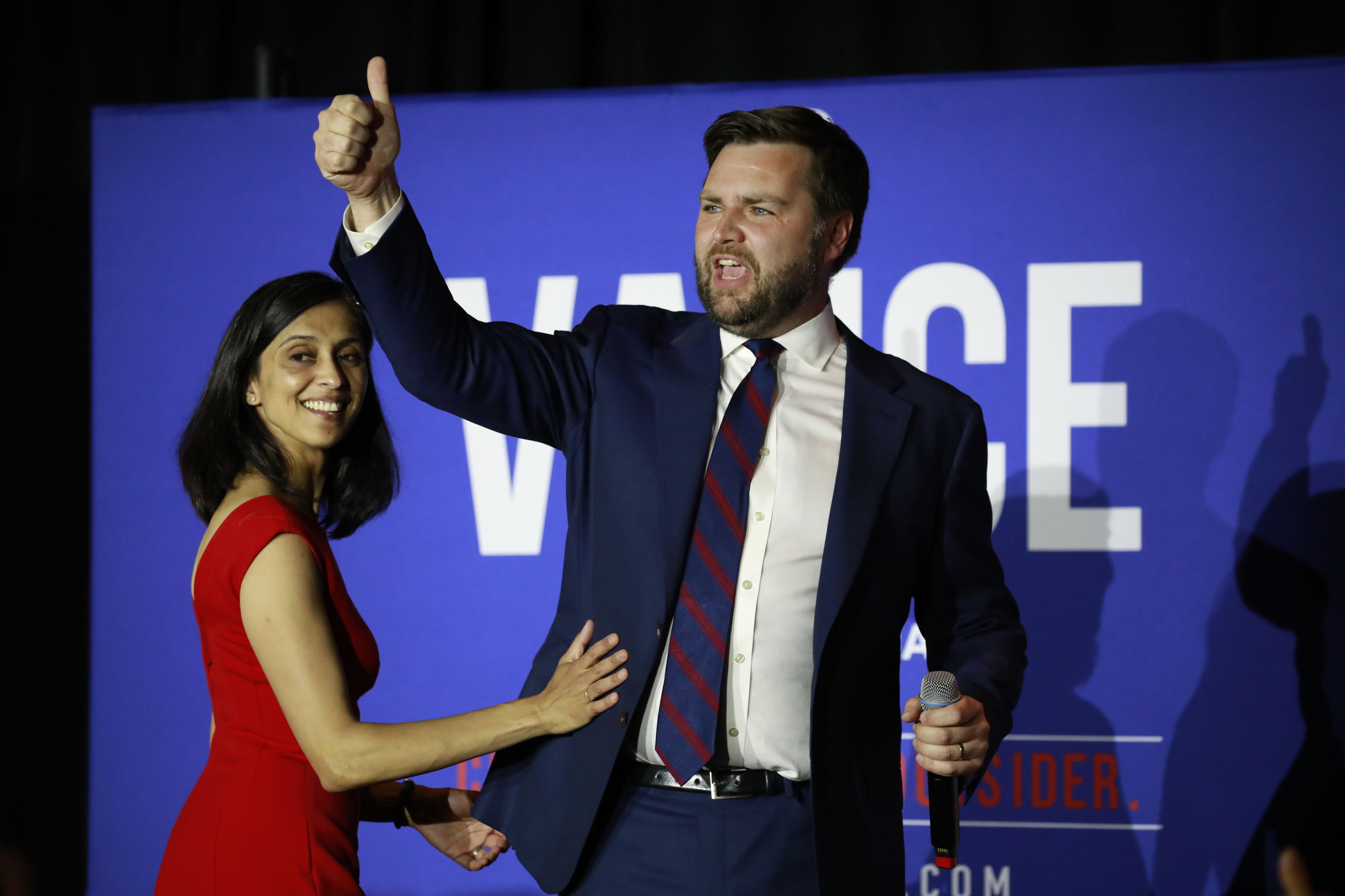If J.D. Vance follows his Tuesday night victory in Ohio's Senate primary with a general election win in November, he'll arrive in a Washington filled with enemies and be seen as arguably the hardest-edged populist nationalist in the Senate GOP.
Why it matters: The Republican establishment privately regards Vance with the same disgust many felt toward Donald Trump when he entered the White House on Jan. 20, 2017.
The big picture: Vance's victory deals a body blow to a small but noticeable resurgence of anti-Trump — or post-Trump — sentiment in the GOP.
- Republican Trump critics staked their hopes on state Sen. Matt Dolan, who accused Trump of peddling "lies" about fraud in the 2020 election and blamed him for the Jan. 6, 2021, assault on the U.S. Capitol.
- But even with four solidly pro-Trump candidates in the race — Vance, Josh Mandel, Mike Gibbons and former Ohio GOP chair Jane Timken — Dolan was unable to marshal a plurality.
What they're saying: Trump spokesman Taylor Budowich said Vance "put in tremendous work and has immense political talent — which put him in the position to earn the support of President Trump," but added that it was Trump's endorsement that propelled Vance to victory.
- "The power of President Trump's endorsement is undeniable, his dominance over the Republican powerbrokers in D.C. cannot be overstated, and the promise of this MAGA Movement will not just define the midterms, but it will win for years to come," Budowich told Axios.
- Vance’s key strategists were Andy Surabian, advising on national politics, and Jai Chabria, steering the Ohio operation.
Between the lines: Amid a wave of retirements by more traditional Republican senators such as Ohio's Rob Portman, Alabama's Richard Shelby and Missouri's Roy Blunt, Vance could be one of a handful of Republicans reshaping the ideological makeup of McConnell's conference.
- Vance has made statements on the campaign trail that have repulsed establishment Republicans, including members of the Senate leadership. Major Republican donors — including the powerful Club for Growth — spent millions trying to defeat him.
- He won a crowded GOP primary running on a position that directly opposes most Senate Republicans — including Minority Leader McConnell (R-Ky.) — on one of the major issues of the day: the Russia-Ukraine war.
Details: McConnell has pushed President Biden to do more to help Ukraine win the war — more weapons, more money. Vance has said Ukraine is not America's problem. He said on Steve Bannon's podcast shortly before Russia invaded its neighbor: "I don't really care what happens to Ukraine one way or another."
- McConnell's stance has the enthusiastic support of virtually his entire GOP Senate conference. Vance's opponents saw an opportunity to use his indifference to Ukraine against him. But Vance didn't budge.
- The Vance campaign's political assessment of his comments about the Russia-Ukraine war was simple, a source close to the campaign told Axios: Voters who supported a more interventionist approach wouldn't vote on the issue, while America Firsters would potentially vote on it.
- "It was a pivotal moment in solidifying the view of J.D. as a fighter by the base and some of the most important media voices on the right," the source said. None of those voices was more important than Fox's top-rated host Tucker Carlson, a major booster of Vance.

How we got here: Vance, a Trump critic-turned-supporter, was written off as dead by many late last year.
- In December — months before Trump endorsed Vance — a source close to GOP Senate leadership told Axios that of all the Ohio Senate candidates, Vance caused the biggest headaches, but the good news was he wouldn't win.
- The senior GOP official said he took solace in the knowledge that the Club for Growth's anti-Vance campaign — millions of dollars of TV ads pounding Vance for his past negative comments about Trump — killed off any hope of him winning.
Around the same time as that GOP official confidently declared Vance a no-hoper, Trump himself was privately offering a similar assessment.
- According to a witness to Trump's private conversations last fall at Mar-a-Lago, the former president would repeat versions of this statement: "I really like J.D., but I just hear he's totally dead. I hear those Club [for Growth] ads are killing him. Totally killing him. They did a number on him."
- The Club's ads did hurt Vance. He dropped to single digits in the polls. But he slowly began recovering. And Trump noticed. He liked that Vance had withstood an onslaught and was coming back.
- Vance was overwhelmingly helped by three people: The former president's eldest son, Don Jr.; Tucker Carlson; and one of the biggest donors in GOP politics, Peter Thiel. All worked behind the scenes to put Vance in a position to get Trump's endorsement.
- Don Jr. ultimately held four rallies, two fundraisers, relentlessly attacked Mandel on social media, called into Ohio radio shows and even made fundraising calls on Vance's behalf to high dollar donors, according to a source familiar with Don Jr.'s activities.
Trump was aesthetically pleased by Vance. He thought he was tough and smart. He also thought Vance's major rival for the endorsement — Josh Mandel — was weird.
- No amount of sucking up from Mandel worked on Trump. He privately mocked Mandel for verging on picking a physical fight with an elderly man — Mike Gibbons — on stage in the Ohio primary debate.
- Trump would hear his own harsh assessment of Mandel reflected back to him by Vance boosters like Reps. Marjorie Taylor Greene (R-Ga.) and Matt Gaetz (R-Fla.)
- After Trump endorsed Vance, he rallied for him, recorded robocalls and allowed his PAC to spend on Vance's behalf. He campaigned harder for Vance than for many Trump-endorsed candidates.







